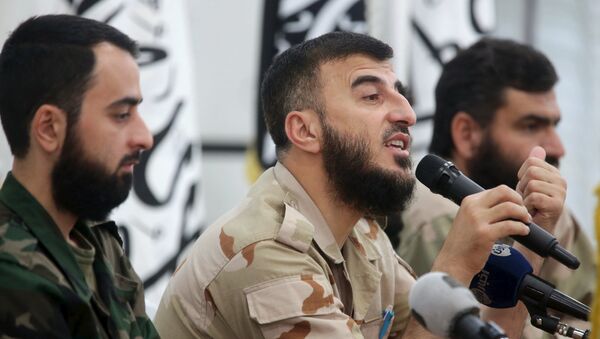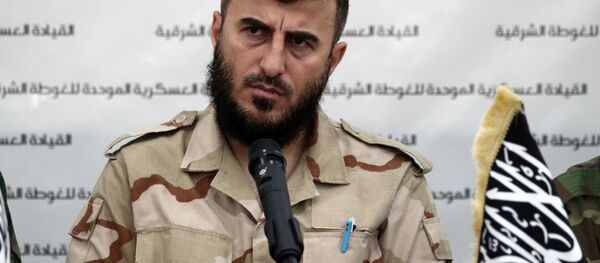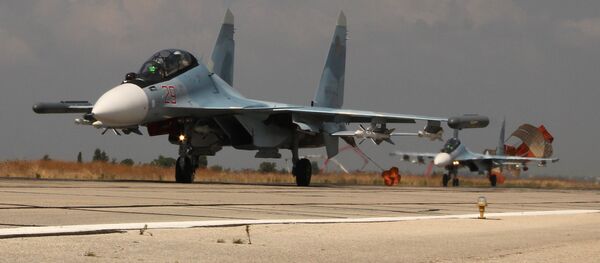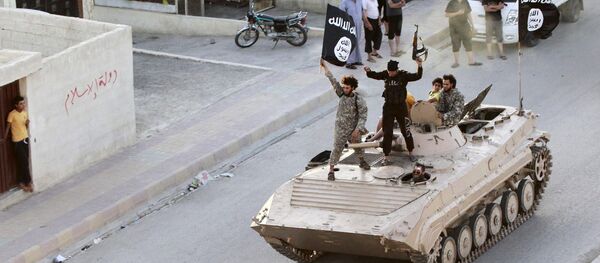On December 25, the Syrian Army confirmed that Zahran Alloush, the leader of the Jaysh al-Islam ('Army of Islam'), a terrorist group operating in the suburbs of Damascus had been killed in an airstrike. Considered one of the most prominent leaders of the armed Syrian opposition, Alloush was the head of a powerful militant group consisting of up to 15,000 fighters notorious for its war crimes.
Jaysh al-Islam's repeated shelling of Damascus and its suburbs with mortar rounds, its military cooperation with the al-Nusra Front, and its brutality toward opponents (including public executions of prisoners, and the parading of civilian women around in metal cages) has led to the group being compared with the Daesh (ISIL/ISIS) terrorist group.
Zahran Alloush led the powerful rebel Jaysh al-Islam group. Called for ethnic cleansing of Shias, pan-#Syria jihad. pic.twitter.com/9tUs05GxK4
— Murad Gazdiev (@MuradoRT) 25 декабря 2015
According to the Syrian Army, Alloush and representatives of other Islamist terrorist groups including Suqour al-Sham and the al-Nusra Front were killed during negotiations on the formation of a terrorist coalition against government forces.
Amazingly, although perhaps not surprisingly, much of the Western media rushed to eulogize Alloush and his 'moderate' Islamist rebels, the Wall Street Journal suggesting that his death "imperiled planned peace talks," France24 running the headline "In death, Syrian rebel chief haunts peace hopes," and CNN lamenting that his death "casts doubt over Bashar al-Assad's intentions."
The US State Department, meanwhile, suggested that Alloush's death sent the "wrong message" when it comes to the political dialogue aimed at ending the Syrian conflict.
#WTF Killing terrorist Alloush who wanted to crush Shia heads doesn't serve peace in Syria? https://t.co/Ewjl4mgO9S pic.twitter.com/tFLuTtveI3
— the Lemniscat (@theLemniscat) 31 декабря 2015
So just who was this terrorist, and why was his liquidation such an apparent blow to the opponents of the Syrian government?
Beginning with a brief biography of the militant, the analyst explained that Alloush, a Sunni Muslim born in the city of Duma near Damascus, "grew up in a religious home, his father, Sheikh Abdullah Alloush, considered one of the leaders of the Salafi movement in the outskirts of the Syrian capital. Zahran received a master's degree in Islamic theology at the University of Damascus, and then went to Saudi Arabia, where he deepened his study at the University of Medina. Following his father's footsteps, Zahran preached in mosques and at meetings on the merits of a strict religious life."
The future rebel commander's sermons, the analyst noted, "were peppered with politics," which got him in trouble with the authorities. "He was first arrested under Hafez Assad, when he was 16 years old…In 2010, a year before the Syrian civil war began, he was again arrested and imprisoned at the Sidnaia prison for incitement against the regime."
"Three months after the beginning of the unrest [in 2011], Alloush was released from prison as part of a goodwill gesture by the Syrian government…He realized that the time had come to attack the regime, and he did not waste time, creating an armed organization known as the Liwa al-Islam ('Brigade of Islam'), and attacking the military under the guise of the bloody events that unfolded in the south of Syria."
"After some time," Hugi noted, "the Saudis made contact with Alloush and began financing the activities of his militia, as they had other organizations fighting against Assad. With time and generous Saudi support, his group grew, and changed its name to Jaysh al-Islam."
This militant group, the analyst explained, "truly is a real army, with at least 10,000 fighters in its ranks and, according to some sources, up to 15,000. They have armored vehicles, air defense and artillery. Unlike Daesh, which gathered Muslims from all over the world, all of Alloush's soldiers are Syrians. Under his tenure, the Jaysh al-Islam reached the peak of its power, capturing the plains of Damascus and firing artillery at the capital, aiming at military bases, but also causing death and destruction among the civilian population. In Damascus he was called Saffah ('gushing blood')."
"Over the past two years, Jaysh al-Islam had become the main force in the 'Islamic Front', among the other opposition Islamist groups fighting against Assad not connected to Daesh…He and his supporters were considered the 'moderate' forces of the opposition camp –however, everything is relative. The Turks, who like the Saudis, handled opposition groups in Syria, also supported him, although more modestly."
"At times," Hugi explains, "there were indications that Alloush was extending feelers to establish contacts with US intelligence. The Obama administration, on the one hand, despaired over Daesh, and on the other, saw Assad as the cause of all of Syria's ills. The US, as usual, looked for allies in a Syria smoldering in conflict and saw in Zahran Alloush a strong leader, popular among the population, who made liberal statements. In reality, when Daesh sets the tone, the Salafist undercurrent behind Alloush also worried the Americans, but to a much lesser extent."
The analyst recalled a US media interview with Alloush, where the militant promised that "if we overthrow the Assad regime, we will give the Syrian people the right to decide what kind of country they want to see."
"The interview," Hugi noted, "was given before the Russian intervention, when his position was relatively strong. Asked how he would treat the Alawite minority (to which President Assad belongs), Alloush responded in a manner pleasant to the Western listener's ear, noting that 'different minorities have coexisted in Syria for hundreds of years. We will not impose our power on our minorities and will not deal with them in a harsh manner. On the contrary.'"
Genocidal scum of Jaysh al-Islam cage Alawite women. The "Syrian rebels" at doorstep of multiconfessional Damascus. pic.twitter.com/0ZMxsKASkT
— Serge (@Zinvor) 1 ноября 2015
Ultimately, the analyst explains, "Alloush's liquidation became a heavy blow to his Saudi patrons, who have observed how, slowly but surely, their grand plans to overthrow the Assad regime and destroy the Shiite-Alawite bloc have suffered a collapse."
"The Syrian-Russian-Iranian coalition continues to draw strength from a series of developments in its favor, with Moscow's intervention in the war three months ago serving as the main event. Equipped with modern weapons and unlimited ammunition, Russian aviation has struck Syrian [Islamist] opposition groups, the destruction of the leadership of Jaysh al-Islam being one of its priorities from the start, with Alloush himself becoming one of the main targets of Russian aviation and intelligence."
As for the Syrian president, Hugi noted, he recently "won a diplomatic victory. After many long years of his opponents trying to persuade the UN Security Council to give the green light for an operation against Assad, on the model of the operation against Muammar Gaddafi in Libya, the Security Council adopted a completely different resolution, stating that the Syrian people alone can determine their future, and any external intervention would be illegitimate. Moreover, in a year-and-a-half, Syria will hold parliamentary and presidential elections. Thus, terrorist groups, who number several dozen, will not be part of Syria's political future."
In the final analysis, Hugi notes, Jaysh al-Islam's successor, "who promised to follow the path laid by his predecessor, has an impossible task on his shoulders. His group has the task of trying to stop the Russian army, one of the strongest in the world, from destroying the organization."





